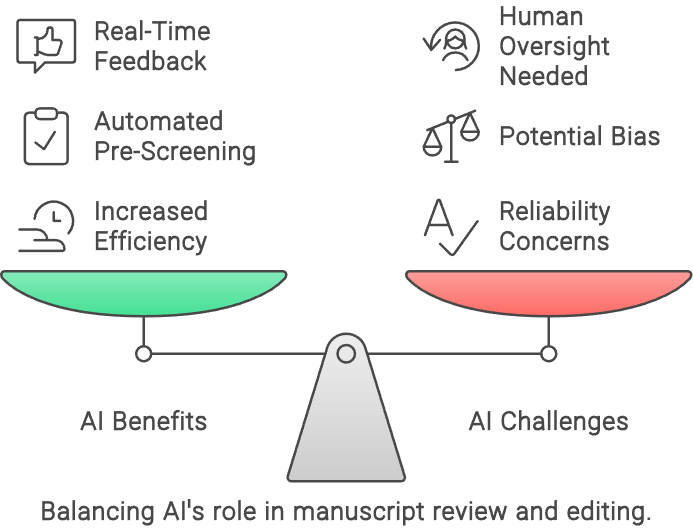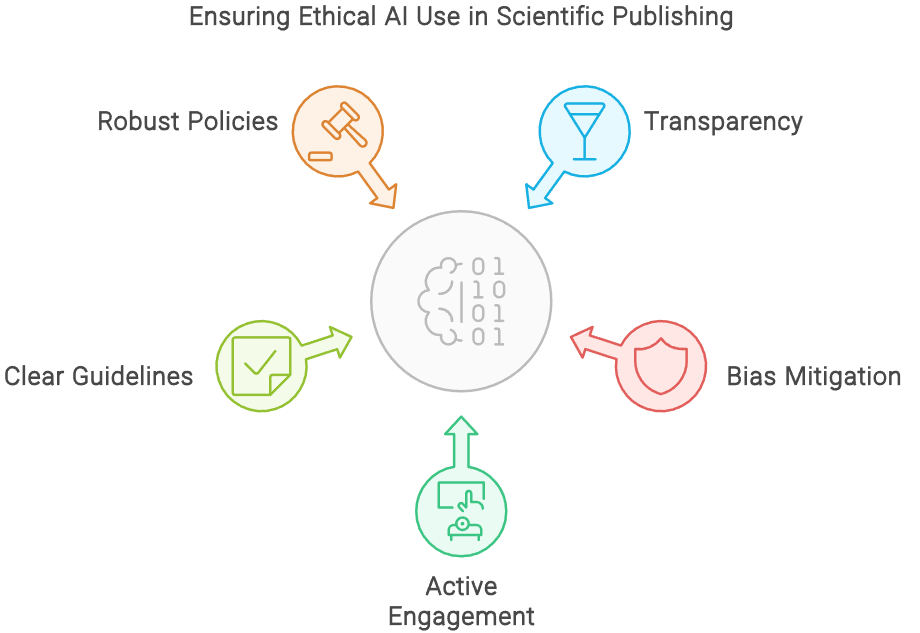As artificial intelligence (AI) continues to advance, its impact on countless sectors grows more profound. AI is making significant strides in scientific publishing. This article explores how AI is reshaping scientific research publishing, the ethical dilemmas it presents, and its future implications for academia.
AI is uncovering new levels of efficiency and accuracy in scientific publishing. AI-powered tools can process vast amounts of data quickly, expediting the publication process. Algorithms can perform initial screenings of research papers, identify key findings, and detect potential plagiarism (Chetwynd, 2024). This speed and precision allow journals to publish high-quality research rapidly, keeping the academic community informed of the latest developments.
However, the integration of AI in scientific publishing is fraught with ethical dilemmas. Algorithms' reliance raises concerns about the transparency of editorial decisions and potential biases ingrained within AI systems. While AI can improve the peer review process, it risks sidelining non-conventional research that doesn't fit predefined patterns. These issues highlight the need for continuous monitoring and refinement of AI tools to ensure they enhance rather than compromise scientific discourse (Chetwynd, 2024).
"The use of AI tools should align with the ethical standards and integrity of the research, emphasizing that authors are solely responsible for the entire content of the manuscript, including parts generated with AI." (PMC, 2023)
Looking ahead, AI's role in scientific publishing is set to expand, with potential transformations in how research is disseminated and conducted. Technologies like natural language processing and machine learning promise to revolutionize literature reviews, grant applications, and hypothesis generation. As these tools become more sophisticated, they could usher in unprecedented collaboration and innovation in academia. To navigate this evolving landscape, stakeholders must vigilantly address the ethical and practical challenges of AI integration, maximizing benefits while minimizing risks.
The Impact of AI on Scientific Publishing
AI in Manuscript Review and Editing
The use of AI in manuscript review and editing is a contentious issue. While AI can assist in streamlining the review process, concerns about its reliability and the potential for bias are prevalent. For instance, a study highlighted the risk of AI-generated reviews lacking the nuanced understanding and interpretative abilities of human reviewers (PMC, 2023). Furthermore, the possibility of AI tools producing voluminous yet generic output adds complexity to the review and editing process, burdening editors and reviewers with the task of sifting through and filtering this added volume (PMC, 2023).

Machine learning algorithms can pre-screen manuscripts for structural consistency and adherence to formatting guidelines, significantly reducing the workload for human editors. This automation accelerates the initial review phase and improves overall efficiency. AI can also assist in recognizing scientific terminologies and identifying statistical errors, ensuring higher-quality publications. However, authors must remain responsible for the entire content of the manuscript, including parts generated with AI, to maintain the integrity of scientific discourse (PMC, 2023).
Moreover, AI tools now provide real-time feedback to authors during submission. This interaction highlights areas needing improvement, offers clarity suggestions, and even corrects grammar errors, enhancing manuscript quality before human review. AI can also flag biases or plagiarism, maintaining ethical standards in scientific publishing (Chetwynd, 2024).
Enhancing Research Discoverability with AI
AI significantly contributes to research discoverability. Traditional indexing methods struggle with the vast body of scientific literature. AI-powered search engines and recommendation tools navigate this complex landscape more effectively, offering researchers more relevant results (NCBI, 2024). By using natural language processing and machine learning, AI systems interpret contextual relationships between articles, identifying trends and connecting related research. These advancements help researchers stay current and foster interdisciplinary collaborations by linking work from diverse fields (Chetwynd, 2024).
"Researchers and authors cannot be complacent in using this tool; instead, they must actively engage in the output created to ensure that it is correct and current in every aspect." (NCBI, 2024)
AI can significantly enhance research discoverability by analyzing and interpreting large amounts of data, identifying patterns and correlations, and making predictions. However, it is crucial to ensure that AI-generated content is accurate, relevant, and transparently disclosed. Researchers should clearly state the use of AI tools in their work and provide details about the methodology and algorithms used to generate the content (Reddit, 2023). This transparency not only builds trust but also ensures that the research community can critically evaluate the AI's contribution.
Furthermore, AI plays a crucial role in democratizing scientific knowledge access. Algorithms that translate complex texts or offer multilingual support break comprehension barriers, making quality research more inclusive (Chetwynd, 2024). AI's potential to democratize access to scientific knowledge should not be underestimated, as it breaks down barriers of comprehension and accessibility, making high-quality research more inclusive (Reddit, 2023
Ethical Issues in AI Research Publication
Despite numerous advantages, AI in scientific publishing raises several ethical issues. A primary concern is the transparency of AI's decision-making. Algorithms in manuscript review or indexing must be transparent for fair results. A lack of transparency can undermine trust in editorial decisions and the integrity of published research (PMC, 2023). Bias in AI systems poses another ethical challenge. These systems, trained on historical data, may carry implicit biases into editorial decisions. This may marginalize groundbreaking, unconventional research that doesn’t align with established norms. Continuous monitoring and improvements are necessary to mitigate these risks (NCBI, 2024).

The ethical use of AI in scientific publishing is paramount. Researchers and authors must actively engage with the output created by AI to ensure it is correct and current in every aspect (NCBI, 2024). The use of AI should be transparent and accountable, with clear guidelines on disclosure and authorship. For example, AI-generated content must be clearly labeled, and the extent of its use in the research process should be fully disclosed (PMC, 2023). Additionally, the potential for AI to perpetuate bias and misinformation underscores the need for robust policy frameworks to guide ethical AI use in academic research. These frameworks should address the risks of bias in AI systems, which are often trained on historical data that may reflect existing prejudices (Reddit, 2023).
Future Outlook
AI's future in scientific publishing looks promising but requires a balanced approach. As AI tools become more sophisticated, they can revolutionize research dissemination and conduct. Technologies like natural language processing and machine learning can enhance literature reviews, streamline grant applications, and contribute to hypothesis generation, paving the way for innovative discoveries and collaboration.
However, it is vital to address ethical and practical challenges posed by AI integration. Academic stakeholders must ensure AI tools enhance rather than compromise scientific discourse. With responsible application, AI could lead to unprecedented efficiency, accuracy, and inclusivity in scientific publishing.
References
- Academic publisher guidelines on AI usage: A ChatGPT supported thematic analysis. (2023). PMC. Retrieved from https://www.ncbi.nlm.nih.gov/pmc/articles/PMC10844801/
- Is it ethical to write a scientific paper using AI? (2023). Reddit. Retrieved from https://www.reddit.com/r/labrats/comments/11v9fmx/is_it_ethical_to_write_scientific_paper_using_ai/
- Ethical Use of Artificial Intelligence for Scientific Writing. (2024). NCBI. Retrieved from https://www.ncbi.nlm.nih.gov/pmc/articles/PMC11015711/
- Chetwynd, E. (2024). Ethical Use of Artificial Intelligence for Scientific Writing. NCBI.





